SEO for landscapers is a marketing tactic that landscaping businesses use to grow.
SEO stands for Search Engine Optimization. SEO is the process of building out a website in such a way that search engines favor it. If you do SEO well, search engines may show their users links to your website. Users can then visit your website and contact you for services.
This can be a great marketing opportunity when you can make your website show up for the right searches. Here are examples of good searches for a landscaping company to show up for:
- “lawn care service near me“
- “landscaper in las vegas“
SEO Marketing Works Well For Landscaping Businesses
SEO is an excellent option for marketing your landscaping business. Think of where people go when they need a landscaper. The answer to this question is, that people often go to a search engine like Google or Bing to find a landscaper.
There are 2 core reasons why SEO is a great marketing channel for a landscaping company.
First Reason: Demand for landscapers is high on search engines
According to Mangools, there are 185,000 people per month searching on Google for “landscaping near me” in the United States every month. That’s a lot of people who want to find a landscaper.
Furthermore, that’s only the amount of people performing that 1 exact verbatim search. There are even more people who search in other ways like “grass cutting service near me” not to mention all the misspellings.
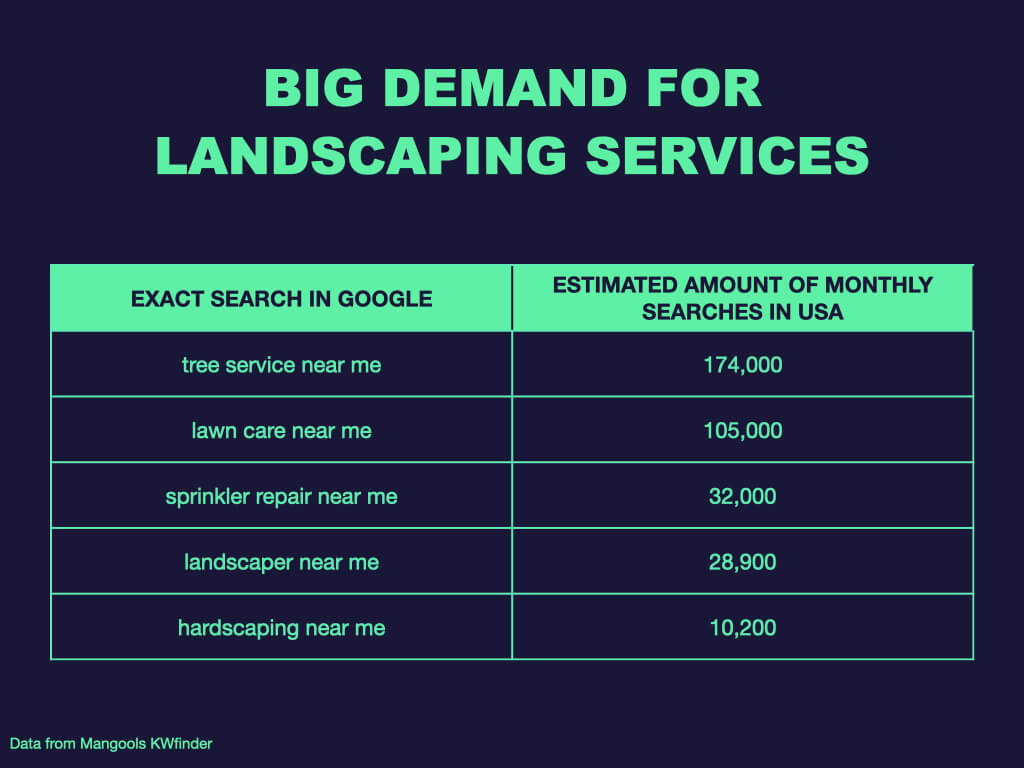
Second Reason: Search Provides an excellent environment for marketing
When users search, this is an excellent time to market to them. The reason for this is that searchers have real-time intent to solve a problem.
Think about SEO marketing as opposed to some kind of advertisement. When you serve someone an ad, often they are in the middle of something not at all related to getting landscaping service. Sure, when they see your ad they might remember they need a landscaper and you might get some business.
The bottom line, you are interrupting people when you force them to see your ads.
Good search results aren’t an interruption, they are exactly what people are searching for. The websites searchers find are helping them solve their problems, as opposed to bothering them. Search is a great opportunity to also make a great first impression with potential customers.

Imagine if your company owned a helpful website that people visited for landscaping services and tips.
Now let’s explore how SEO fits into a landscaper marketing strategy.
How to Market a Landscaper Business
Before we dive into landscaper SEO, let’s take a minute to observe where SEO falls in the marketing mix.
There are 2 main types of marketing channels businesses rely on:
- Digital marketing channels
- Traditional marketing channels
Traditional marketing channels are the ones that existed before the Internet. This category might include things like:
- TV ads
- Newspaper ads
- Phone Book Listings
- Billboards
- Networking Events
- Church bulletins, etc.
Digital marketing channels are online. In the next section, we will review most of them. SEO is only 1 aspect of digital marketing, but if you have the budget for it, SEO is likely the best choice for small businesses.
Common Digital Marketing Channels for Landscapers
Here are the common digital marketing channels used by landscapers with a little explanation of how each of them works.
- Search engine optimization (SEO) – Optimizing web content so it’s findable on search engines.
- Example: You improved the content and code on your website and now it shows up when people in your town Google “landscaper near me”.
- Paid Advertising (Includes PPC) – Paying to display ads for your business on social networks, search engines, and other websites. (PPC means “pay-per-click” advertising)
- Example: You run a Facebook ad targeting people in your local area offering a coupon for their first lawn care service.
- Check out our guide to Landscaper Digital Advertising.
- Social Media Marketing (SMM) – Using social media platforms to spread awareness of your product or services.
- Example: You post pictures of your latest jobs on Instagram with local-oriented hashtags.
- Check out our list of Social media Post Ideas for Landscapers
- Email marketing – Sending emails to potential customers to entice them to buy your service.
- Example: You send out an email blast to 100 people you meet at local events to offer them special deals.
- Check out our post on the Benefits of Email Marketing for Landscapers
These channels all “work”. Which channel you end up using depends on a variety of factors. Some factors to consider:
- Your geographical market. For example, you might live in an area dominated by elderly people who don’t use the internet. OR you might live in a white-collar suburb filled with tech-savvy consumers. Both of those settings likely have different dominant marketing channels landscapers use.
- The exact nature of your service. For example, you might focus on a specific niche of landscaping. This means you probably need to rank in search engines for it.
- Your business growth goals: For example, if you want to have a large landscaping company with customers in many towns. SEO is great for that.
- Your preferences. For example, you might have 0 desire to show yourself or your work on social networks. So that’s likely not good for you. OR it could be that you love taking pictures and have tons of them from various projects. That could serve as great social media content, which would give you an edge.
From my experience, if budget is a concern then it’s generally the best choice to pick one digital marketing channel and stick with it. Once you have some results from that channel, you can add another.
There are other big reasons I’m biased in favor of SEO over email, social and ads. Those other channels need constant upkeep and recurring budget. Sure, there’s some maintenance involved with SEO long-term. But once SEO is built out, you generally keep a lot of the results with much less effort than the other channels.
Read our full guides on:
Understand the Difference Between SEO and SEM
You might hear the term “SEM” getting thrown around. With all these acronyms some people tend to think SEO and SEM are the same when in fact they are not
“SEM” stands for “Search Engine Marketing”. This encompasses both SEO and paid search engine ads.
Many people refer to search ads as “PPC”. This stands for “pay per click” and is the model that most search engines use to charge advertisers.
SEO results are not paid, they are what we call “organic.” No one can “pay” a search engine for their SEO to be good. Search engines choose websites to show their users that they think will give searchers a good experience. When search engines have more users, they get more clicks on ads and make more money.
Check out the difference between a paid ad and SEO (“organic”) results in the screenshot below.
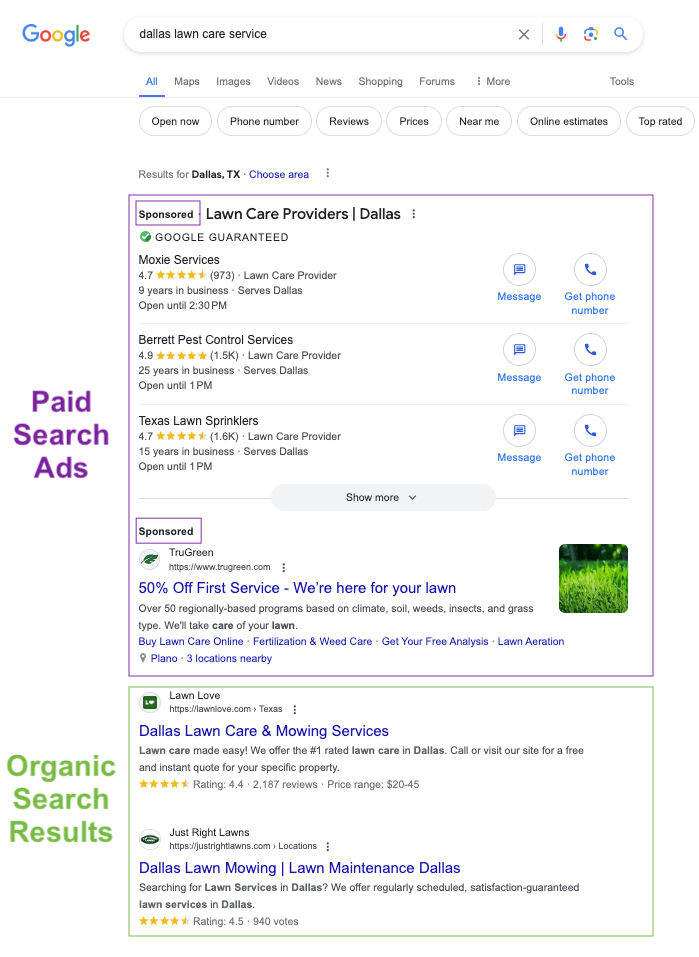
Leveraging Empathy to Market Yourself
Using empathy in your marketing, especially marketing messaging can be very effective. Being empathetic in marketing is when you tailor the user’s experience specific to their wants and needs.
Search is an excellent channel for this. You or an SEO service provider can use many tools to see exactly what users search for and how they search for it. This data gives you excellent insight into what your potential customers want and need.
Plus helping you be an empathetic marketer, search data can also tell you the following information:
- How users in your area search for landscaping
- How many are looking for specific landscaping services every month
- How much Google ads cost in your area
- How hard it would be to rank your website at the top of the organic results
Knowing how people in your area search for landscaping lets you tailor your website to their needs. This is another advantage of SEO marketing over other channels.
Understanding the Basics of SEO
Here is the rough definition of SEO I provided above:
SEO is the process of building out a website or map listing in such a way that search engines favor it.
When you do SEO you are trying to achieve 2 things:
- Make search engines love your website (Google is most important)
- Give users a great experience that meets their search intent
How SEO Works in a Nutshell:
- Every day people search 3-4 billion times on Google alone.
- There are SEO tools that identify the searches people use. We call these search terms keywords.
- “landscaper near me”
- “landscaping scottsdale az”
- “artificial turf installation”
- “lawn care service”
- You then find keywords that match your products and services.
- Then you need to create webpages with content that “targets” the keywords that match your products and services.
- You also need to make sure Google’s software called a web crawler can easily navigate the code on your website.
- You will need other websites to link to your website. This is so Google can use its algorithm to verify you are an “authority” in your industry.
Example Keywords:
The Benefits of SEO for Landscapers
There are many benefits of SEO to landscapers. For starters, it’s a great way to grow your business.
As it compares to other marketing channels though, here are 2 more of my favorite benefits of SEO:
- You catch users when they are looking for landscaping services, making most leads high quality. This is why conversion rates for SEO traffic are way better than for paid ads. (A conversion rate is the percentage of your website visitors who contact you for service.)
- Once you build out your SEO, you can maintain it long-term which improves your margin. It doesn’t mean that you rank in the top 3 for the search “your town + landscaper” now that you will for the next 10 years. It is possible though. Also, if you lose your ranking position to new competition, if your SEO is already built out, it’s not hard to fight back.
Stats About SEO & Why You Should Care
If you are a data-driven person, you might be asking yourself, where is the proof? The evidence that SEO is a viable channel for growing a landscaping business in 2024.
Here’s how the story goes:
Tons of people use Google every day.
- There are 8.5 billion searches per day on Google alone. (Demandsage)
Most people start their browsing session with a search.
- 68% of online experiences begin with a search engine. (Brightedge)
There is a multimillion-person pie of individuals searching for landscaping every year.
In the United States every month,
- 105,000 people search for “lawn care near me”
- 92,100 search for “lawn maintenance services near me”
(Mangools)
Lots of people searching for landscaping services don’t know who they will hire when they start their search. This means their money is up for grabs.
- 80% of people don’t have a specific lawn care company in mind when they search for one online. (Invoca)
The demand for landscaping is going to continue to grow in the United States.
- The landscaping industry in the US is growing at 3.89% Mordor Intelligence
- The US population is still growing Congressional Budget Office
If you take a minute to think about this, the climate for investing in landscaping SEO is positive. It also has a long-term positive outlook. That means even if it costs you thousands to set up, SEO has a good chance of being worth it.
The Big Opportunities in SEO for Landscaping Companies
Let’s talk for a minute about what the desired result for landscaper SEO looks like.
Google Organic Results and Map Pack
Most landscapers and lawn care pros run local-oriented businesses. This has an added benefit for SEO since you can rank in the “Google Maps Pack” too.
Check out this image below for a visual explanation. (Note that Google Maps also has paid and organic results):
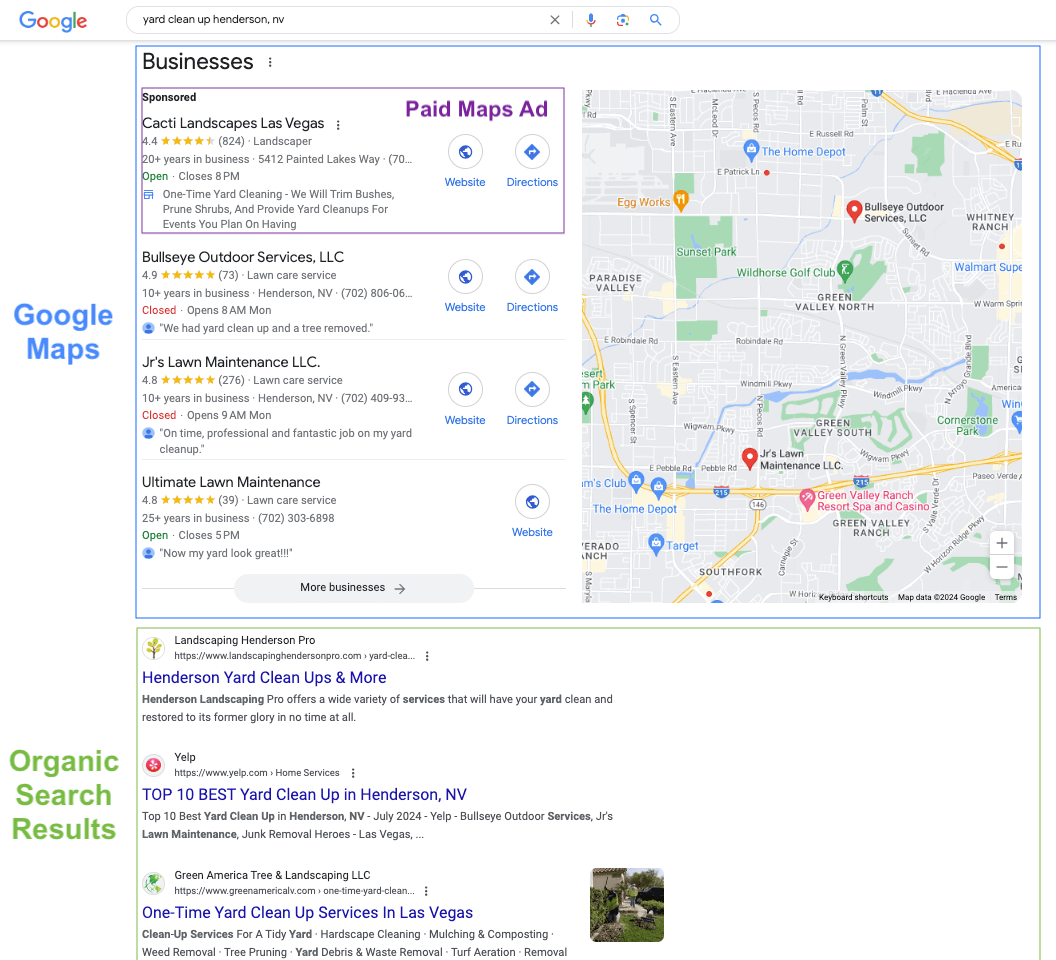
You want to rank high in both the organic results and the maps. These should be the goals of any SEO campaign for a landscaping company.
Here are some stats to illustrate why you should care so much about doing SEO on your Google Maps listing:
- 40% of local search clicks go to the Map Pack (Widewall)
- 46% of Google Searches have local intent (MeetSoci)
That’s a lot of demand for local services and a lot of clicks on the maps.
Advanced SERP features
There are more places to rank on search engines but they are lesser known. These are called Advanced Search Engine Results Page (SERP) features.
A common example of that is the dropdown questions. In SEO circles, these are called “People-Also-Ask Questions”.
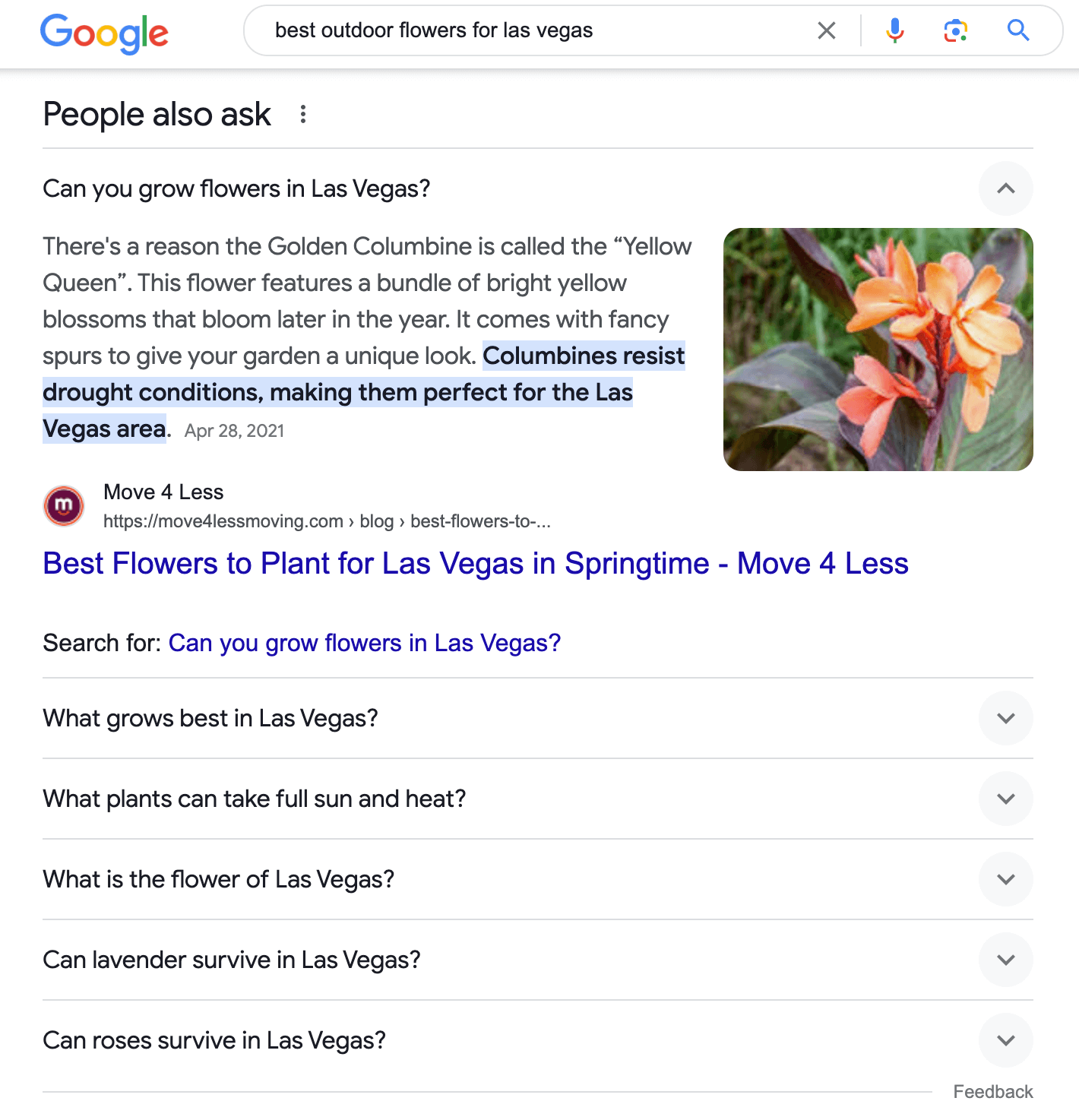
Bing
Let’s also not forget about Bing. Since Bing drives over 7% of all traffic to websites (SparkToro), it can be worthwhile to make sure you show up there too.

Note in the image below, that Bing also has a maps section.
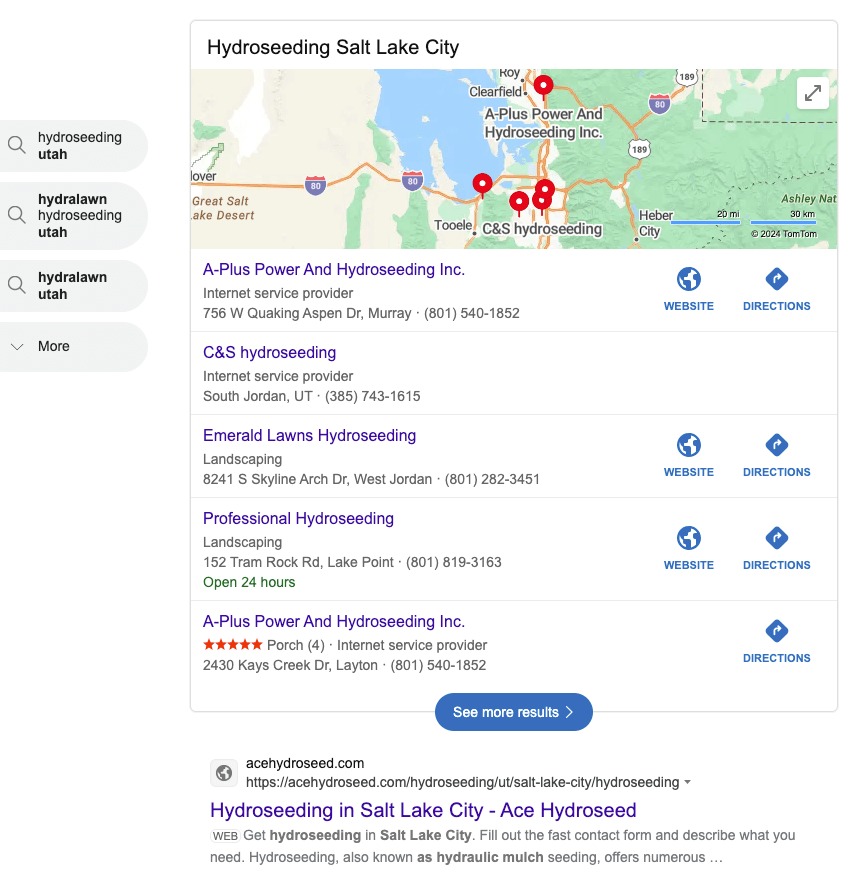
You might be wondering what about other search engines like Yahoo and DuckDuckGo? It’s still worth it to optimize for them, but they are very low priorities compared to what I mentioned above.
Local SEO: Dominate Your Local Market
When you run an SEO campaign for a landscaping company it’s usually targeting the local area.
As mentioned above, around 40% of all local SEO clicks from Google go to the maps.
This means it’s imperative to make sure your Google Business Profile and Maps Listing are optimized. You want to make sure you stand out and that Google likes you.
Here are 2 important tips for improving your ranking in Google Maps:
- Fill out all the information in your Google Business Profile
- Make sure you get a lot of 5-star reviews
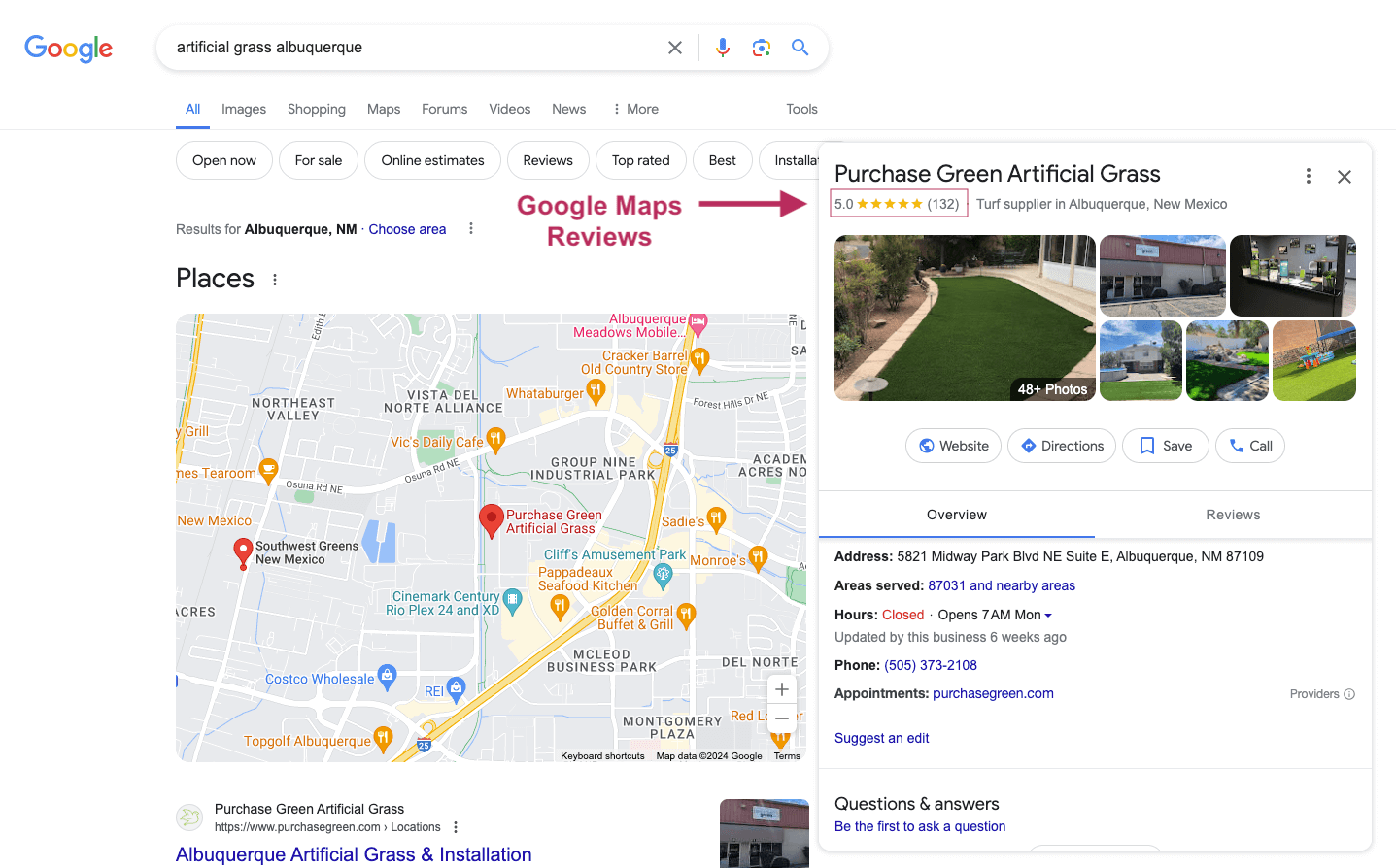
Terms to Know for SEO
Before we go any further and discuss specific SEO tactics, let’s define and review some more terms.
Keyword: The words users type into search engines while performing a search.
Organic: Earned placement in search engine results, as opposed to paid advertisements.
Intent: In SEO, intent refers to what searchers want to know or do from the words they type into a search engine.
Ranking: Ordering of results shown by the search engine for the keyword.
SERP: Acronym for “search engine results page”. The page you see after searching on a search engine.
Traffic: Users visiting a website.
Index: All the websites available in a search engine.
SEO Campaign Components for a Landscaping Company
Before starting your Landscaping Business’ SEO campaign, it’s important to understand its key parts.
Try and have a good idea of how SEO works before getting involved in any capacity. It will either help you start to DIY SEO for your landscaping company OR help you hire a reliable SEO service provider.
SEO Campaigns are About Satisfying Ranking Factors
People are combing through search results on behalf of companies like Google and Bing to investigate quality. That isn’t how most search results are determined though.
Generally, search engines use algorithms to mass-generate their search results. There are too many different searches for them to do it any other way.
That said, knowing the factors that influence search engine algorithms is crucial for doing SEO. These “ranking factors” are the basis of SEO campaigns.
This is a running list of 200 known ranking factors that can increase your website’s rank.
Keyword Research for Landscapers
As stated above, keywords are the words that users type into search engines when they perform a search. SEO tools like AHREFs or SEMrush can help you find all kinds of keywords for SEO campaigns.
Keywords have 3 important metrics associated with them:
- Monthly Search Volume (MSV) – This is the amount of times per month people search for an exact keyword.
- Cost-Per-Click (CPC) – This is the amount of money 1 click would cost if you bought a search ad for that keyword.
- Keyword Difficulty (KD) – An estimate of how difficult it would be to rank for that keyword. These metrics aren’t universal, they’re specific to the tool, you’re using.
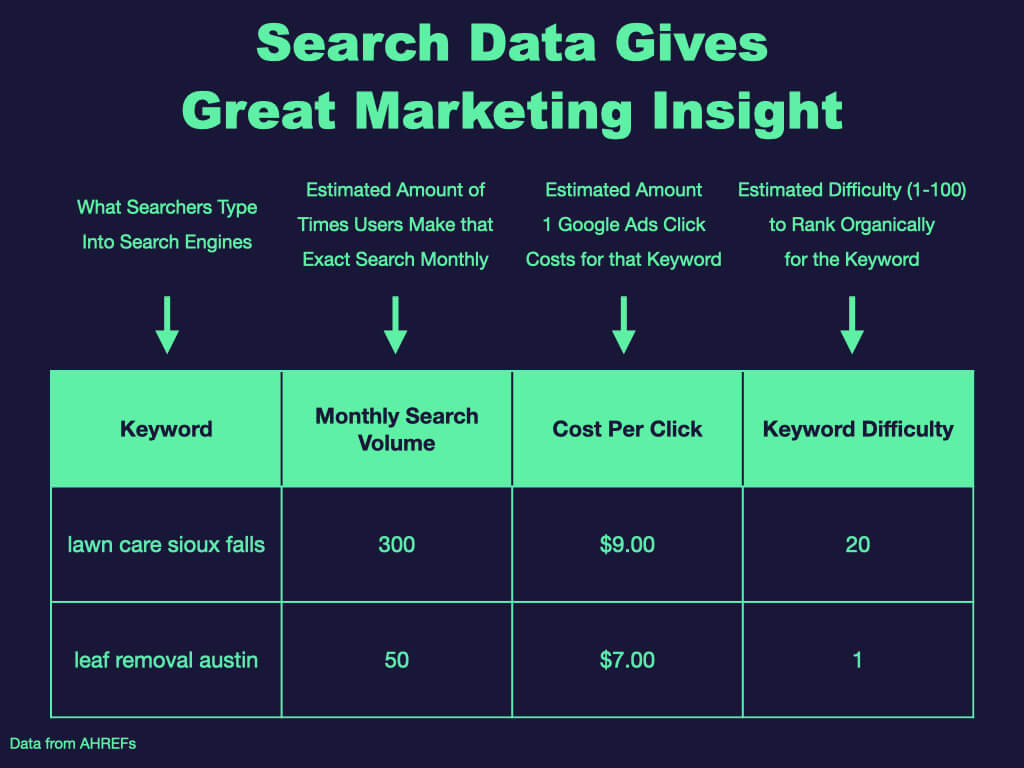
You can use a variety of SEO tools to even spy on what keywords are bringing SEO traffic to your competitor’s website.
Keywords are generally broken up into 4 categories:
Informational – Keywords people search when they are looking for information or answers to questions.
Example: “best outdoor plants for las vegas”
Navigational – Keywords people search when they are looking for a specific webpage, website, or other resource.
Example: “bob’s landscaping service boston”
Commercial – Keywords searchers use when they are in the customer journey but not ready to buy. Generally when they are investigating products, brands, or services.
Example: “best landscaping companies in denver”
Transactional – Keywords people search when they are looking to buy something or hire a service.
Example: “lawn care near me”
Selecting the right keywords is one of the most important parts of the whole campaign. SEO campaigns generally take months and years to pull off. If you select the wrong keywords in the beginning you are putting a huge investment in danger.
To make sure you don’t make a mistake, either get good at SEO keyword research or hire a trustworthy SEO service provider.
Landscaper Keyword Research Resources
- Here is a timeless starter guide to keyword research if you want to try and do it yourself.
- Here is a list of landscaping SEO keywords.
- Here is a link to get a free marketing plan from our SEO agency to help you crush SEO.
Technical SEO
Search engines use a software called a crawler to gather the websites they show users. It’s usually depicted as a spider.
Technical SEO is all about making sure search engine crawlers can access your website and all its different parts with ease. This generally means making the code on your website efficient.

You can use a tool such as Screaming Frog to extract and analyze the code on your website. That’s how you perform a technical SEO audit. After you finish the audit, you then need to apply the changes to your website’s code. Many companies hire a web developer to help them do this.
Aspects such as your page speed, mobile friendliness, site security, and image performance are also part of technical SEO.
On-Page SEO
You will hear and read the word “On-page SEO” in your quest to rank your landscaper website. “On-page SEO” is anything you do to YOUR website to help it rank better in organic search. This is different than “off-page SEO” which we cover below.
Emphasis on title tag and meta description
The title tag and meta description are important parts of your technical and on-page SEO. The title tag and meta description are HTML code elements that live in the head of your website. The head of the website is a part of your website that doesn’t display when you load the page.
These are so important because they help dictate how your webpage displays in search results. The “search results listing” if you will.
The title tag is extra important for 2 reasons.
- Optimizing it is a key ranking factor.
- It can increase your click-through rate. Writing it in such a way that it uses emotional and provocative copywriting to enhance clicks.
Most search engines don’t use meta descriptions as ranking factors. They can increase click-through rates though.
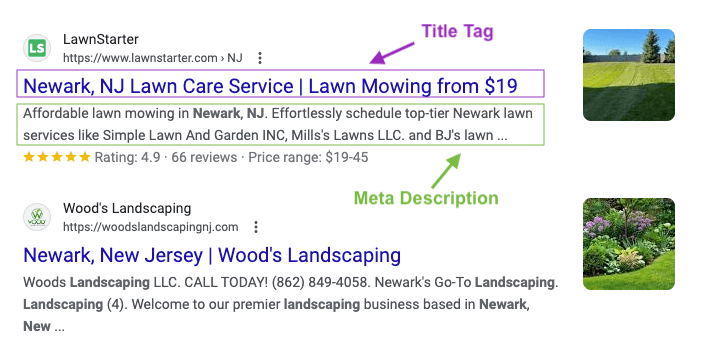
Here is what they look like in the code of your website.
If you can’t code, make sure you use a website builder or plugin that has an input field for title tags and meta descriptions.
Off-Page SEO: Building Authority
Off-page SEO is a collection of tactics performed on websites other than your own to improve YOUR website’s ranking in search engines.
Search engines like Google use mentions of you on other websites to measure how popular and “authoritative” you are. This helps them use their algorithm to mass generate their search results and push good websites to the top.
Backlinks
Backlinks are the hyperlinks on other websites that go to your website.
This is a backlink to Google.com.
Search engines want to help users find the “real world authorities” on topics via the internet. Backlinks are one of the main factors that help search engines understand how legitimate you are. This is how they measure how much “authority” or relevance to a topic you have.
Think about it, if you are in an industry and have expertise or are well known, others would be referring to you or citing your work. If you had a large network of connections, you’d have a lot of people in your industry that link to your website. If you had done something big in your industry then people would link to you because of it.
In the simplest form, you need to help search engines understand that you are REAL. A real live business and not some scammer website AND good at what you do.
You need to at the very least, make sure high-quality websites link to your website. The kind of high-quality websites that you’d expect a real business to get links from. There are tons of fake websites trying to look like real businesses all the time. Show Google that isn’t you.
Some of the easiest backlinks to get for a landscaping business that wants to improve their SEO:
This all said backlinks are not all created equal. A search engine won’t value all links the same. For example, a link from the New York Times website is going to be worth more than a link from your cousin’s website.
The last note about backlinks is since they are such a strong ranking factor for websites, search engines are strict about them. They don’t want anyone using underhanded methods to create links to their websites. If you get caught doing this, you can even have your website penalized by a manual reviewer and removed from the search results.
If you think about it, this is in search engine’s best interests. Google, for example, drives so much web traffic that they need spam filters like those for backlinks. Otherwise, everyone would try to rank websites there all day for free traffic. But then, the search results for regular users would be so much worse.
Citations
Citations are mentions of your business on the internet. They are usually profile or directory websites like Yelp. These don’t always come with a backlink but sometimes they do.
The most important part of citations is that your business info is the same on as many as you can control. These are the specific items that need to be consistent across all your business’ online citations.
- Business name
- Address
- Phone number
In SEO circles these are referred to as your NAP (Name, address, phone number).
Above all, this will help your Google Maps listing rank higher. This is because Google uses these citations to verify the validity of your business details for map listings. If Google can verify that these details on your maps listing match all your citations they know they can trust it. So that means you’re probably a real business they can offer their users.
Content Marketing SEO for a Landscaping Company
Content marketing is one of the most important parts of doing SEO for your landscaping business.
Content is what ranks in search engines, what the users consume on your website, and what they see on your maps listing. When users are consuming your content, that is the perfect time to market to them.
Landing Pages
Landing pages are usually the sales-driven pages of your website. You want the searchers who are looking for services to land on these pages. After a user lands on one of these pages the goal is to “convert them.”
Converting someone in digital marketing is when a website user takes the desired action you want them to take. For a landscaping business, this is generally the user:
- Requesting a quote
- Calling you
- Sending you a message like a contact form submission or email
Location and Service Pages
Most landscaping businesses are locally oriented. This means you generally service a specific geographical area. This is why for landscaping SEO campaigns, most of the campaigns need to target local keywords with their landing pages.
Most of these pages need to focus on selling a location-based service. This is because of the way people search for landscaping services.
Most of the good opportunities in the space will often follow this convention:
“service” + “geographical area”
For example:
“tree service atlanta”
By the way, that specific search keyword, “tree service atlanta” has 300 searches monthly in the USA. That’s a lot of customers who need tree service in one area.
Blog Posts
Another great SEO opportunity for a landscaping business’ website is blog posts. Blog posts are articles about content related to your business.
There are a few reasons we need blog posts in SEO. Here are some of the big ones:
- There are lots of keywords we can target to raise awareness of your brand. There are also opportunities to make sales with blogs, but not as much as with landing pages.
- We do blog posts because Google likes websites that have informational content as well as transactional content.
- Google favors webpages that are on the same website as other web pages that provide a good user experience. It is competitive to rank landing pages for transactional keywords. Targeting easy blogs and getting traffic shows search engines that your site offers a good experience. So writing blog posts can help landing pages rank.
- Blog posts can build relevance for your website. By writing content related to your service and area, search engines will associate your website more with both.
Blog posts should be high quality and SEO optimized. Here are some examples of keywords for blog posts to target:
- “when to plant grass seed seattle” (100 searches a month)
- “miami backyard ideas” (20 searches a month)
Remember the total search volume opportunity for a page is not only the volume of the main target keyword. It is the sum of the volumes of all the keywords the page targets.
As it relates to the example above, that includes variants and misspellings. For example:
- “miami small backyard landscaping ideas”
- “miami backyrd ideas”
The opportunity is real. Having a built-out SEO-optimized website with a blog is the same as owning a local landscaping media platform.
Imagine owning the website that locals go to for answers to their landscaping questions. Then you’re allowed to push your service on there as much as you want. Sound like a good opportunity?
Content Ideas
Here is a good way to find keyword ideas for your SEO-optimized blog to target:
- Make a list of all the common questions you get as a landscaper.
- Go Google those topics.
- Put the top-ranking URLs for those topics into competitor research SEO tools.
- See what kinds of keywords the pages rank for.
- Target those keywords with your content.
AI and SEO Content Creation
When people hear that making a bunch of content is the answer to growing their company they think of ChatGPT. Sure ChatGPT can help you write lots of SEO content quickly.
Not so fast though. While creating content with AI doesn’t technically violate the terms of major search engines, is it a good idea? Not in my opinion. This is because when generative AI came out tons of people used it to try and game SEO.
The truth is, that the start of the AI era was when the quality of search results dropped. Search engines responded by creating very high-quality standards for content.
So does this mean you can’t use AI to make content? No, AI content isn’t “banned.” But from my experience, I’ve learned that the per-minute ROI from a high-quality piece of handwritten content is way higher.
User Experience
Search engines want to sell ads, so they need users searching to show those ads. The more users they have, the more ads they sell, the more money they make. For this reason, search engines are invested in providing a good user experience.
When you visit a search engine, a good user experience also depends on the user experience of the websites the search engine recommends.
For this reason, providing an excellent user experience is an essential part of SEO.
User experience or “UX” is also a complex part of SEO. UX has to do with many aspects of a website. This ranges from the website design to the user’s perception of the brand.
User experience designers are kind of like marketing psychology, design, and analytics experts.
Most website builders come with a good enough user experience for you to get started without spending a ton of time on it. That said, there are basic elements you need to get right.
Here is a link to a great free UX class I’ve studied over the years.
Don’t want to take a class or hire a UX expert? Here is a hack. Have your spouse or friend use your website, and tell them to try and complete a goal on your website. For example, calling you or requesting a quote. Then ask them how easy or hard it was. Ask them what annoyed them about your website. Then change whatever it was that made their experience hard or annoying.
Conversion Rate Optimization
It is worth noting that once you do get SEO traffic, you can add Conversion Rate Optimization or “CRO” to your campaign. CRO falls under the larger UX umbrella.
CRO is the art and science of getting a higher percentage of your website’s users to take the action you desire them to take. For example, on a landscaping website that’s getting more people to contact you for service or a quote.
GBP SEO
As mentioned above in the Local SEO section, your Google Business Profile (GBP) is what can rank in Google Maps search results. Since so many local searchers click on the maps this is an important part of your campaign.
You can add so much information and media assets to your profile to make it rank better. This includes images and video. You should also fill out as much of the profile as you can.
You also want to focus on getting as many good reviews as possible.
Think about your own experience. Consider these questions when optimizing your Google Business Profile.
- What do you look for in a brand before you agree to give them your money?
- Do you appreciate the store that has its holiday hours updated?
- How about the restaurant with pictures of their interior and food? Wouldn’t it be cool if you needed a place for your mom’s birthday and a restaurant had a video of them singing Happy Birthday to a customer?
- Are you going to call the handyman with all 2-star reviews? It’s unlikely.
For a landscaper, there are tons of things people want to see.
- Add images of your best work
- Showcase different types of projects
- Add some pictures of you or your team working
- Mark your service area
- Add all the services you offer
Tracking and Measuring SEO Success
At the very least, these are the 6 analytics tools you want to use to collect data.
- Google Analytics 4 – Google’s free website analytics tool. This tool provides insight into a wide range of website performance insights. You use this tool with pretty much any kind of digital marketing campaign, even if it isn’t SEO.
- Google Search Console – This is a free tool from Google that helps you submit and track your website in Google Search.
- Bing Webmaster Tools – This is a free tool from Microsoft that helps you submit and track your website in Google Search.
- The Performance Tab of Your Google Business Profile – Stats about your GBP’s performance.
- A Rank Tracker – A tool that tracks your website’s ranking for your priority keywords. (Examples: Rank Ranger, STAT)
- A GMB Rank Tracker – A tool that tracks your Google Business Profile’s ranking for your priority keywords in the maps. (Example: Local Falcon)
In the future, you should also set up Google Tag Manager, call-tracking software, and a UX monitoring tool like Hotjar. For you to get started though, the first 6 tools are enough.
Metrics to Track
These are the basic metrics you should be tracking during your SEO campaign. This is how you should measure your success or your service provider’s success during your campaign.
Google Search Console and Bing Webmaster Tools:
- Measure non-branded clicks and impressions. These are searches where the keyword does not include your brand or name, e.g., “lawn care near me” is non-branded, while “Bob Smith landscaping” is not. Non-branded searches matter because they come from people discovering your brand through search.
- Measure branded clicks and impressions. These are searches where the user was looking for your exact business, as shown above. They already knew about you before searching.
To be clear, a click is when someone clicks on your landscaping company’s website. An impression is when a searcher sees it in search results, but it doesn’t mean they clicked on it.
Additionally, Google Search Console only tracks clicks from Google. Bing Webmaster tools only track clicks from Bing. Other search engines don’t offer tools like these.
Google Analytics 4:
- Measure your total organic sessions. These are all the people who came to your website through search engines, not limited to Google and Bing.
- Note: The numbers you get from here likely won’t exactly match the numbers you get from the other tools. This is due to search engine’s user privacy rules.
- Measure your goal completions. Goal competitions measure the amount of people who “completed a goal” on your website. Goals can be set up in Google Analytics. For a landscaping business, these are usually:
- Contact form submissions
- Request for quote
- Taps on the instant phone number tap-to-call button
GBP Metrics
- Keep track of calls, messages, and website clicks as applicable.
Rank Tracking Tool:
- Keep track of the rank of your most important keywords (make sure to set up alerts so you know if your rank changes).
GBP Rank Tracking Tool:
- Keep track of your GMB’s rankings in different locations that are important to you.
Search Engine Algorithm Updates
Search engines make regular updates to their algorithms. This usually causes temporary search result changes. Sometimes the changes can be more long-term.
When there are large shake-ups in search engine algorithms, businesses need to make changes to their websites to make sure they comply. This can help get lost rankings back.
Landscaping businesses using SEO must watch for local-oriented search engine updates. You can follow Search Engine Land’s Local SEO News to stay up to date.
Advanced SEO Strategies for Landscapers
SEO can become quite a complex and technical field, especially in competitive markets. There are great lengths to which one can go to optimize their website for search engines.
A good SEO agency or freelancer should offer these advanced items:
- Schema Markup – These are big blocks of code that can help search engines understand your company at a deeper level.
- Topic Clusters – This is a strategic way of building out content for a certain topic. This can help search engines think you are the “authority” around a certain topic. An example of this would be building out a content hub for all the local plants in your area. This is more of a long-term play.
- Optimize for Featured Snippets and PAAs – As we said above, there are ways to make your content appear in the exclusive parts of search engines. Like the dropdown (people-also-ask questions) mentioned above, but also featured snippets (answer boxes) and image packs. See below.
Image Packs
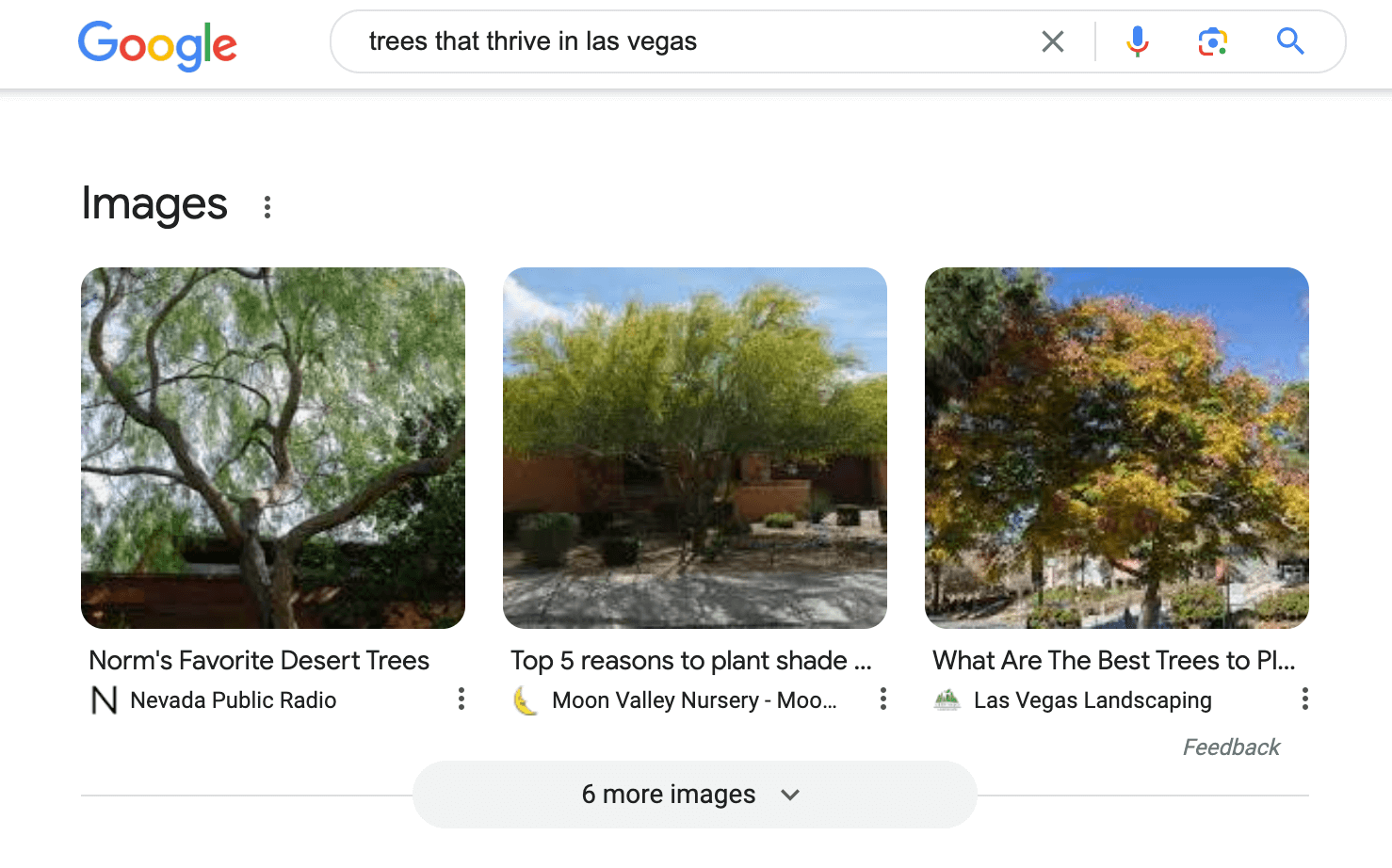
Featured Snippets
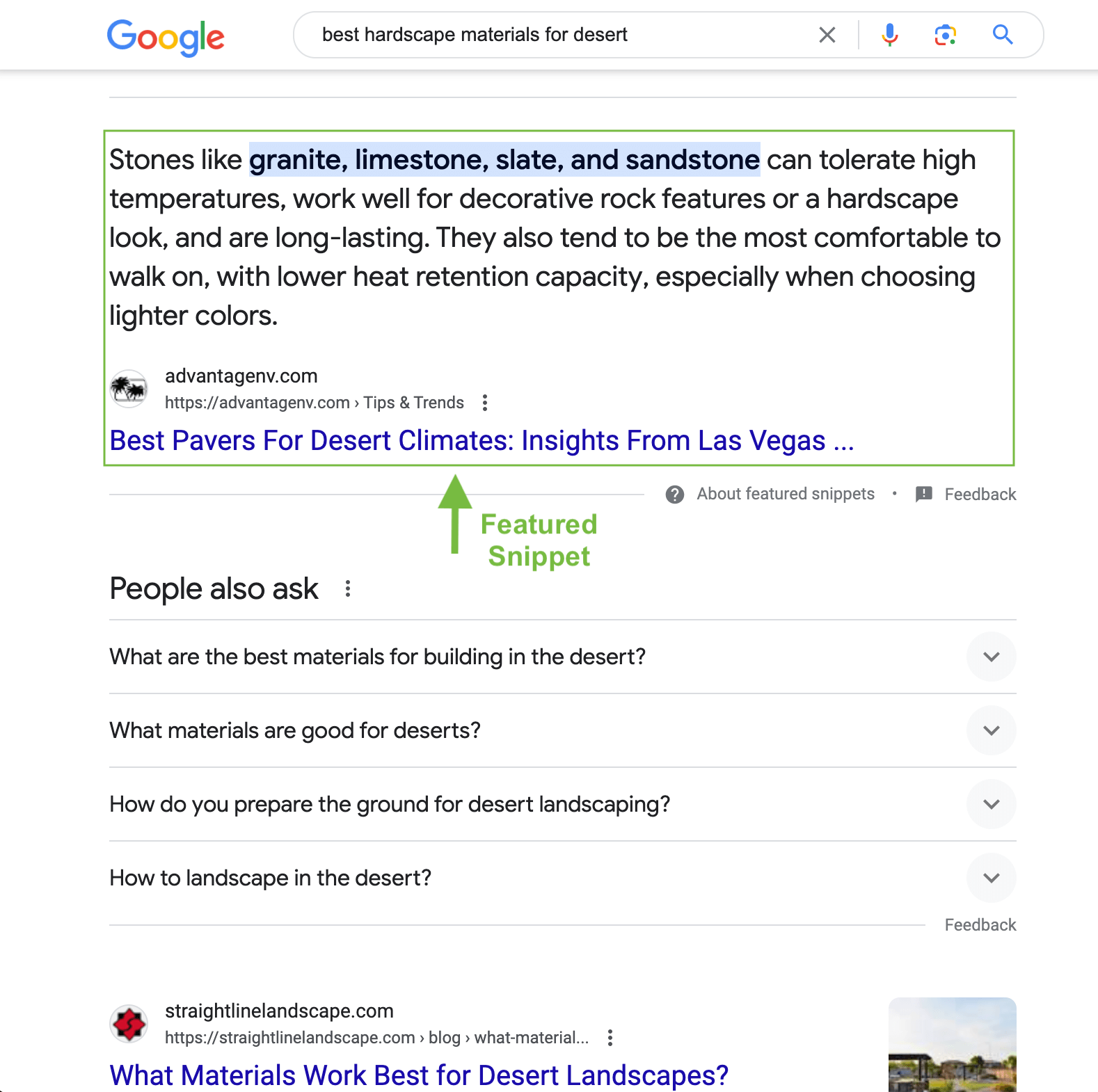
- Internal Linking – Strategic positioning of the links on your website that link to other pages on your website. You can use this tactic to channel backlink authority toward pages you want to rank.
There are a lot more things I could add to this list. But this should be enough for you to quiz any landscaping SEO service provider you talk to.
Future of SEO for Landscapers
If you didn’t read the stats above about why SEO is so good for landscaping businesses then here is a link that takes you there.
In short, there is a huge demand for landscapers by search engine users. That means you have a huge opportunity that is unlikely to change as long as 2 facts remain true.
- People seek out services related to landscaping
- People use search engines to search for products and services
There is no sign that this could change anytime soon. Google and Bing continue to grow. The truth is that people search in a lot more places than Google and Bing.
The future is bright. Part of the reason is that the opportunity to do SEO for your landscaping business on all sorts of platforms will continue to exist. This is on top of traditional search engines.
Some of these other platforms besides traditional search engines include:
- Youtube
- TikTok
In summary, the opportunity for you to get more landscaping customers through SEO is still growing.
Is AI Going to Kill the SEO Opportunity for Landscaping Companies?
No one knows, but it seems very unlikely. If we move toward a more AI-driven search future then people are still going to be searching for landscaping businesses, but with AI Search. This means you will want your website and map listing to show up there. You will still need to optimize your website for the AI search engine to achieve this. This means SEO isn’t going anywhere anytime soon.
Is there a seasonality for Landscaping SEO?
There is a seasonality to the landscaping search market. This seasonality mirrors the seasonality you see in the general landscaping services market.
People likely don’t need their grass cut in January in Minnesota.
If you want to track the seasonality of your primary services you can use a free tool called Google Trends. Google Trends shows the search volume trend for topics over time.
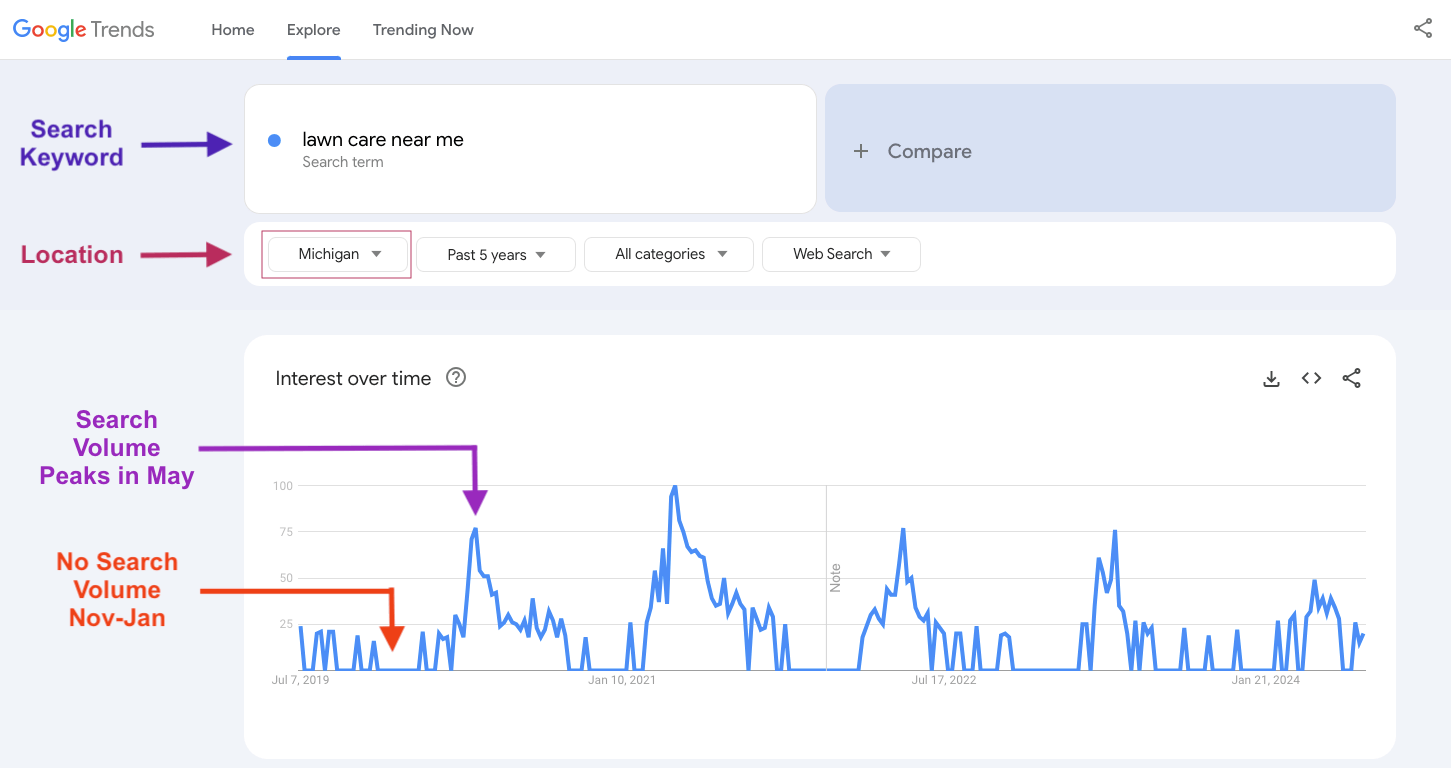
Do reviews impact your SEO?
Yes, reviews impact your SEO. They factor into your ranking potential on Google Maps. Reviews can also sometimes impact your organic search ranking. At the end of the day, reviews are only one factor search engines consider when ranking businesses.
Search engines want to show their users options where they are likely to get good service. If you have bad reviews SEO isn’t out of the question for you. You will need to do a better job with other factors.
You can also turn your review reputation around. If you have bad reviews, then at least respond to them and be sincere. Try to make it up to customers where things went poorly. You might even persuade them to change their bad reviews. You are also allowed to defend yourself when bad reviews are unwarranted, but be polite about it. This is much more respectable and convincing than not responding to people at all.
It also doesn’t hurt to come up with a strategy for getting good reviews. Ask your loyal customers, ask family and friends who you service. Note: Don’t give an incentive for reviews, this breaks Google’s Terms of Service.
Hiring an Agency for Landscaper SEO
Should you hire an agency or a freelancer to do your landscaping company’s SEO campaign? We think that hiring an SEO professional is best.
Doing a full SEO campaign for your landscaping business is a ton of work. It also requires a lot of expertise to be successful. Especially in mid-to-high population markets where competitors may work with pro SEO marketers.
From the perspective of productivity, specialization is efficient. If you spend all your time doing what you do best then your return is likely to be higher. If you spend your time doing something highly technical that you have little experience doing your return will be lower. What you do best is likely running your landscaping business, not optimizing websites.
That means your ROI on your time investment is likely best spent doing landscaping jobs. It’s likely a bigger financial risk to try and do your SEO yourself. A common outcome for service businesses who try and DIY SEO is they waste tons of hours trying to do SEO and get nowhere. They could have spent those hours making more money than they’d have paid some SEO service providers to do it for them.
How to find a good landscaping SEO service provider?
- Talk to us to discuss an SEO campaign for your landscaping services business.
- You can also request a free marketing plan from us where we create an SEO strategy for you for free.
Bonus: Do SEO on Your Social Media
As mentioned above, the opportunity to get customers from SEO is greater than on traditional search engines alone.
Some platforms where people search for inspiration or ideas where you can do SEO:
- TikTok
- YouTube
Here is a tool you can use to find keywords for those platforms.
Frequently Asked Questions (FAQs)
Can I DIY my landscaping business SEO?
You sure can. It might be a lot of work though and you might not get it right. It’s also unclear if it’s a good use of your time. If you’d like to try, here is a guide to learning SEO that is a total classic.
How much does a Landscaping SEO Service cost?
Service costs can vary. You can find people who aren’t trustworthy or don’t know SEO well that will be inexpensive. Our agency prides itself on professionalism and results, our services start at $599 per month. A comprehensive campaign will likely be worth it in the long run.
Is SEO worth it for my landscaping company?
SEO is likely worth it for your landscaping company, even if it’s a little expensive. If you spend $15,000 to get your SEO built out, that sounds like a big investment. But if you get 30 new regular customers plus 4-5 big jobs a year for 5 years, you could make hundreds of thousands of dollars in ROI. Sounds worth it.
How long does a landscaping company’s website take to rank in Google?
It depends on a variety of factors. Most campaigns take 1-2 years to realize significant ROI. Established landscaping companies that have had websites for years might be able to rank much quicker. Brand-new domains will take the longest to rank.
Is there a way to estimate ROI for my SEO campaign?
Yes. SEO campaign results have a degree of predictability through forecasting models. You should make any SEO service provider you work with provide you with an estimate. They should tell you how much traffic and how many calls they can get you by a certain date.
Want to know how your SEO campaign would perform? Get a free marketing plan now, we include forecasts for you.
Why Choose Us for Your Landscaping SEO Campaign?
Choose our agency, ClickTechnica for your SEO campaign. We are experienced, honest, and results-oriented people who want to skyrocket your growth.
What makes us different
Not only are we transparent, but we also hold ourselves to goals. For certain SEO packages, we guarantee you results.
Free Marketing Plan
Want to see what strategy you should use for your landscaping businesses’ SEO campaign? Want to see an analysis of your competition? Request a free marketing plan from us now. We will also tell you how much it costs for us to execute the plan for you.
Get in touch today
Contact us today to discuss total SEO domination for your landscaping business!

